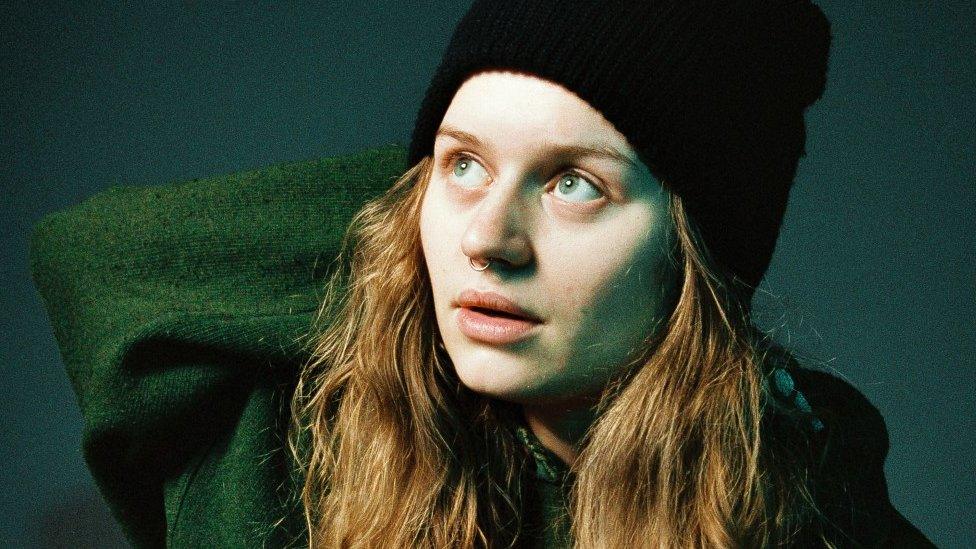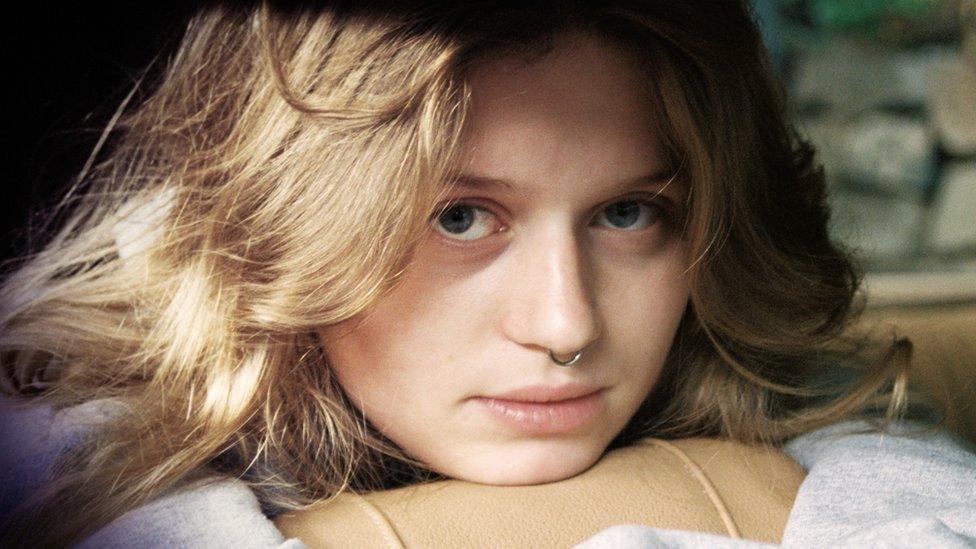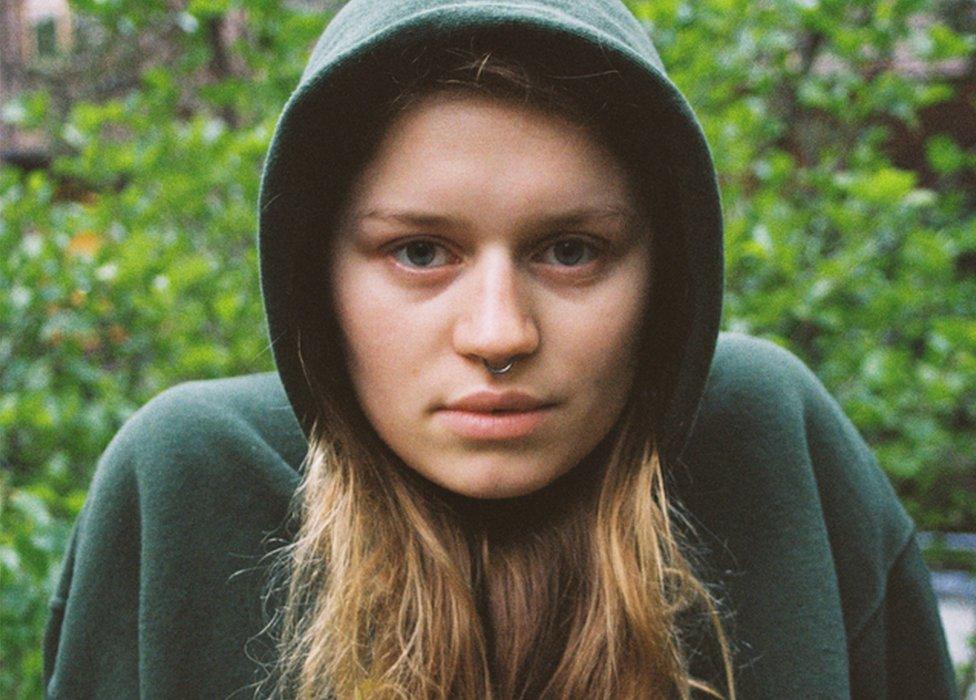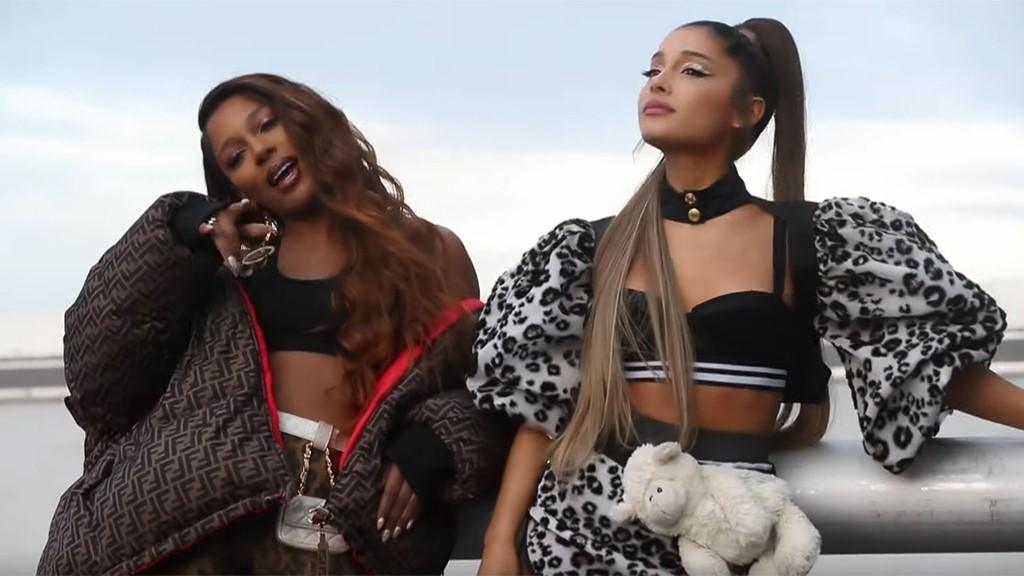Girl In Red: 'I'm a genre-free artist. Open to everything'
- Published

Girl In Red: "My shows are really honest and it just like feels like a warm hug"
"I'm having the worst period of artistic doubt right now," declares Norwegian singer-songwriter Girl In Red.
The 22-year-old has just received the test pressing of her debut album, If I Could Make It Go Quiet, and she's finding it hard to play it without hearing things she'd like to change.
"It's been really hard to let it all go," she says. "At some points I've been like, 'This is the best thing I've ever made!' But the longer I wait for it to come out, the more nervous I get. I'm like, 'Is it really good enough?'"
Thankfully, her seven million Spotify fans can relax. Based on the new songs she plays the BBC, the album is an early highlight of 2021: spiky, candid, and packed with indie-pop bangers.
The stand-out is Serotonin, which was crowned Annie Mac's "Hottest Record In The World" on BBC Radio 1 on Wednesday.
'I've had intrusive thoughts for 10 years'
On the surface, it's a snappy, upbeat pop anthem - but the lyrics plunder the gruesome, unwanted images that haunted her during adolescence.
"I get intrusive thoughts like burning my hair off / Like hurting somebody I love... So scared I 'm going to end up doing something stupid."
You can hear the panic rising in her voice, as distorted drums and disembodied voices emphasise the terror. Then the chorus sweeps in like serotonin itself, allowing her brain's "chemical imbalance" to stabilise.
Lyrically and melodically, it draws on her own experiences.
"I've had intrusive thoughts for quite some time, probably for the past 10 years: Thinking I'm going jump out of a window, thinking I'm going to jump in front of the train. It's really intense and you feel like you have to fight with yourself like to not do it.
"Like, I don't want to jump in front of trains. I want to be alive but if I'm at a train station and I see that yellow [safety] line, it's like, 'Oh my God.'
"I feel like I need to hold myself and go away and lean against the wall to be sure that I'm not going to do anything crazy."

"A thought is just a thought"
Research suggests that the majority of us have intrusive thoughts, external from time to time. Most people dismiss them and get on with their lives but, for some, they can get out of hand - especially if they suffer from anxiety or OCD. There is often an accompanying fear that the thoughts mean something terrible about them.
"People don't talk about them because it makes you sound mad," says the singer, whose real name is Marie Ulven. "It's that scary thing of knowing that you're actually in control of your body."
Ulven wrote Serotonin after starting therapy last year, a process that helped her understand her impulsive thoughts and "get [them] out of my system".
"I learned that these are not things that I want. This is not who I am. I actually don't want to, like, run into a crowd of people with an axe. A thought is just a thought.
"The minute I realised that, then I was OK with talking about it because I have a much more relaxed relationship to it. I can sort of acknowledge that I'm actually OK."
Guitar struggles
People who fell in love with the lo-fi, home-brew aesthetic of Ulven's early songs will notice a big difference in Serotonin. It's more vibrant, more ambitious, more direct without losing the intimate emotional insight of her previous work.
Some of the credit goes to Billie Eilish's brother Finneas O'Connell, who helped sculpt the song's fractured soundscape after meeting Ulven backstage at a festival in 2019. "Serotonin is one of the coolest songs I've ever heard and I am thrilled that I got to be a part of it," says the Grammy-winning producer.
But even without him, Ulven's music has outgrown its bedroom pop origins.
On the echo-drenched, guitar-driven I'll Call You Mine, she sings a yearning tale of summer romance; while the trenchant Did You Come is a brutal takedown of a cheating partner.
"I'm not upset / I'm [expletive] pissed," she spits. "I spelled it out / You're illiterate."
"That's my favourite line!" she says. "I wrote it in the beginning of the first lockdown in Norway, when I was just walking on the beach.
"It's just a really rude song about someone who screwed you over."
The transformation in her songwriting is striking - but Ulven explains it away with a shrug of the shoulders. "All of the music that's been out previously, that's like two years old. This is just sort of where I'm at right now."

Ulven writes and produces all of her material from her flat in Oslo's artsy Grünerløkka district
Ulven's story starts back in 1999 in the seaside town of Horten, about 100km south of Oslo, where her father was a policeman and her mother worked in retail.
"I was a quirky little child," she says. "I was really obsessed with fingerboarding and The Simpsons and Minecraft. I even made my own pickaxe!"
She got her first guitar as a Christmas present from her grandfather when she was 12, but struggled to get to grips with it.
"Learning an instrument is really hard," she recalls. "I think a lot of people want to learn but when it doesn't sound as good as they want, as fast as they want it to, they lose interest."
It was only a year later, after she became obsessed with The Smiths, David Bowie and The Ramones that she resolved to conquer the fretboard once and for all.
"It took me two years. Even today, anything where you have to stretch your fingers, I'm still like, 'Am I doing it correctly?'"
A brief spell in a school band followed - but Ulven decided she was better off making music on her own. Unable to afford studio time, she retreated to her bedroom and taught herself Garageband.
"I was selling newspapers and I didn't have a job. But I had a MacBook and I had some very low-end gear and I just wanted to get stuff done.
"The first time I ever recorded a song was in 2015 and when I heard my own voice, I literally fell in love!"
Unlike many singers, "I like listening to my own voice," she says, "So I've sort of always just been obsessed with recording."
Fell In Love With A Girl
For two years, she released music in her native tongue under her own name. You can still find a handful of those songs on Spotify, external, but Ulven wouldn't advise checking them out.
"Those songs are an important part of my journey, but the lyrics are really bad," she says. "It feels like I've just gotten a guitar and I'm trying to learn how to write."

The singer has amassed seven million monthly listeners on Spotify before even releasing her debut album
By 2017, she was experimenting with pseudonyms - first of all Lydia X, then Lyfsuxxx before settling on Girl In Red.
The change coincided with her coming out (her stage name is a reference to a former crush, who was wearing red when they first met). Now writing in English, Ulven started making relatable, romantic songs about queer love.
The second track she released as Girl In Red was We Fell In Love In October, featuring the chorus: "My girl, my girl, my girl / You will be my world."
The next, I Want To Be Your Girlfriend, was a heartfelt plea: "Oh Hannah... I don't wanna be your friend, I wanna kiss your lips."
Allow YouTube content?
This article contains content provided by Google YouTube. We ask for your permission before anything is loaded, as they may be using cookies and other technologies. You may want to read Google’s cookie policy, external and privacy policy, external before accepting. To view this content choose ‘accept and continue’.
"I had fallen in love with a girl and then school ended and I didn't see her all summer. So it was like eight weeks of heartbreak. Every day, just checking my messages. Did she text me? Did she snap me?"
Frustrated, Ulven "started singing all the things I wanted to say" to the object of her affections ("Just look at me the same!") but then she got cold feet: Not about exposing her feelings - but because she hated the song.
Two months later, she decided to upload it to Soundcloud anyway. It got 5,000 streams, proving (she thought) her point. "I was like, 'I was right, it wasn't a good song!'"
Then something strange happened. In January 2018, I Want To Be Your Girlfriend was reposted by a YouTube channel called Lost Soul, and started to pick up momentum.
"I don't even know who that person is," says Ulven, but she owes her career to their patronage. As her views crept up, she began posting more songs, attracting attention from record labels in Oslo.
"I started getting emails saying, 'Hey, who are you? Want to go for a coffee?' And I was like, 'Why do these people want to drink coffee?' because I didn't know label language!
"But it was just like a way of people being like, 'Hey we want to get to know you.'"
'A warm hug'
In the end, she decided to keep ownership of her music, releasing through the distribution service AWAL, while producing and recording everything herself with the £107 microphone she keeps at home.
"Taking command is necessary if you want to have your own voice," she says. "Especially now that it's so easy to make your own music. It's like, a lot of people can sing but what's your artistic voice at the end of the day?"
Allow YouTube content?
This article contains content provided by Google YouTube. We ask for your permission before anything is loaded, as they may be using cookies and other technologies. You may want to read Google’s cookie policy, external and privacy policy, external before accepting. To view this content choose ‘accept and continue’.
The fact that the music comes directly from her, with no filters and no interference, has earned Girl In Red a passionate and growing fanbase. Many of them are LGBT themselves, and have found solace and guidance in her lyrics.
On TikTok, the phrase, "Do you listen to Girl In Red?" has become a coded way for young gay women to connect; and fans have frequently sought out Ulven's advice on their sexual identity.
"In the beginning I would DM everyone and they would tell me about how they came out and how they needed help. I was like, 'I don't know what to do! I'm 18 and I'm in Norway!'
"It was a little bit unhealthy, because it took a lot out of me emotionally."

Girl In Red's debut album is due out on 30 April
She's since learned to "put up a fence" to protect her own mental health, but there's still a symbiotic relationship with her fans.
"My shows are really honest and it just feels like a warm hug," she says wistfully. "I miss my fans so much. It needs to be fixed."
She's less enamoured with the press, which has taken to labelling her alternately a "queer artist" or a "bedroom pop star" - classifications that her debut album more or less explodes.
"Y'all are trying to put me in a box that I just don't feel at home in," she says.
"I am a queer person, who started making music at home. But what does it even mean to be a bedroom pop artist nowadays? Most musicians probably have a low-key setup at their place so they can record their ideas before they take them into a professional studio.
"So right now I am denouncing those labels. I'm a genre-free artist. Very open to everything.

Follow us on Facebook, external, or on Twitter @BBCNewsEnts, external. If you have a story suggestion email entertainment.news@bbc.co.uk, external.
Related topics
- Published6 December 2020

- Published6 January 2021

- Published8 April 2019
